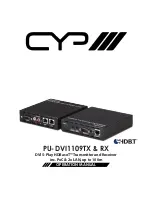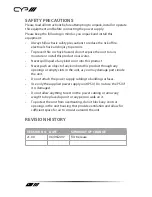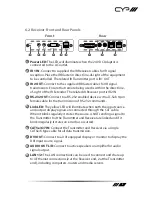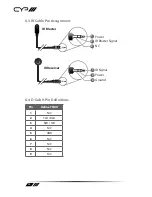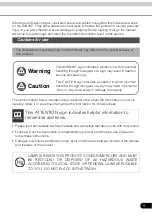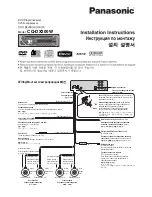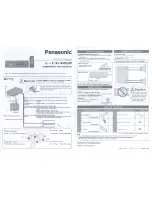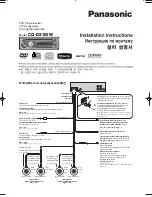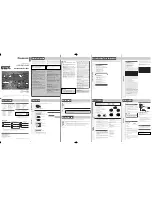
9
6.2 Receiver Front and Rear Panels
LAN 2
LAN 1
R
L
DVI OUT
AUDIO OUT
POWER
OUT
IN
RS232
OUT
CAT5e/6/7
IN
LINK
IR 2
IR 1
1
2
3
4
5
6
7
8
9
Front
Rear
1
Power LED: The LED will illuminate when the 24 V DC Adaptor is
connected to the AC outlet.
2
IR 1 IN: Connect to supplied the IR Receiver cables for IR signal
reception. Place the IR Blaster in direct line-of-sight of the equipment
to be controlled. The related IR Transmitter port is IR1 OUT.
3
IR 2 OUT: Connect to the supplied IR Blaster cables for IR signal
transmission. Ensure that remote being used is within the direct line-
of-sight of the IR Extender. The related IR Receiver port is IR2 IN.
4
RS-232 OUT: Connect to a RS-232 enabled device with a D-Sub 9-pin
female cable for the transmission of RS-232 commands.
5
Link LED: The yellow LED will illuminate when both the input source
and output display signals are connected through the CAT cable.
When it blinks regularly it states the source is NOT sending a signal to
the Transmitter but the Transmitter and Receiver are linked and if it
blink irregularly it states an error has occurred.
6
CAT5e/6/7 IN: Connect the Transmitter and Receiver via a single
CAT5e/6 type cable for all data transmission.
7
DVI OUT: Connect to a DVI equipped display or monitor to display the
DVI input source signal.
8
AUDIO OUT L/R: Connect to active speakers or amplifier for audio
signal output.
9
LAN 1/2: The LAN connections can be used to connect and share up
to 4 Ethernet connections (2 at the Receiver end, 2 at the Transmitter
end), including computers, routers and media servers.

